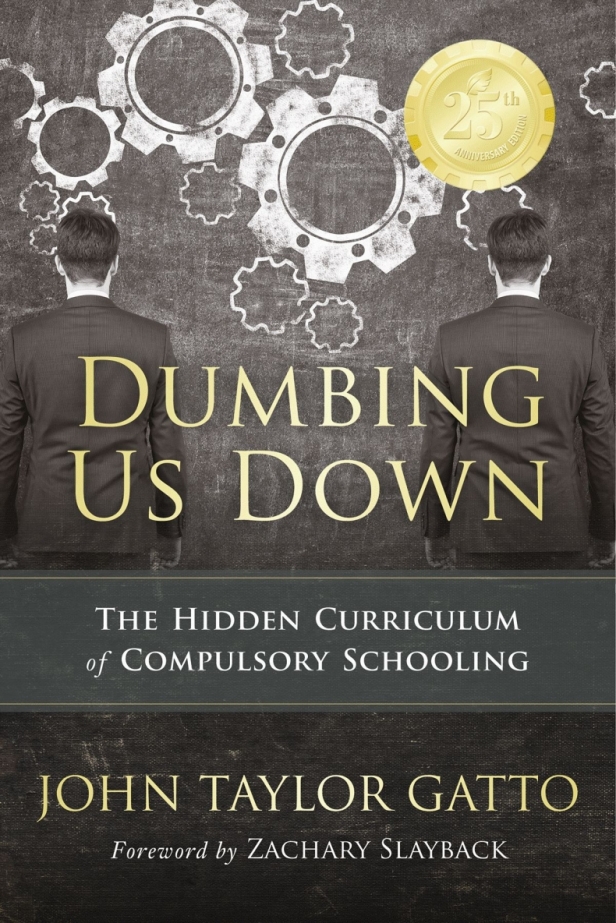← Dumbing Us Down The Hidden Curriculum of Compulsory Schooling
Dumbing Us Down The Hidden Curriculum of Compulsory Schooling Chapter 2. The Psychopathic School
Author: John Taylor Gatto Publisher: Gabriola Island, Canada: New Society Publishers. Publish Date: 1992 Review Date: Status:📚
Annotations
38
This great crisis that we witness in our schools is interlinked with a greater social crisis in the community. We seem to have lost our identity. Children and old people are penned up and locked away from the business of the world to a degree without precedent: nobody talks to them anymore, and without children and old people mixing in daily life, a community has no future and no past, only a continuous present.
38 In fact, the term “community” hardly applies to the way we interact with each other. We live in networks, not communities, and everyone I know is lonely because of that.
38 School is a major actor in this tragedy, as it is a major actor in the widening gulf among social classes. Using school as a sorting mechanism, we appear to be on the way to creating a caste system, complete with untouchables who wander through subway trains begging and who sleep upon the streets.
38 It rings a bell and the young man in the middle of writing a poem must close his notebook and move to a different cell where he must memorize that humans and monkeys derive from a common ancestor.
39
OUR FORM OF compulsory schooling is an invention of the State of Massachusetts around 1850. It was resisted—sometimes with guns—by an estimated eighty percent of the Massachusetts population, the last outpost in Barnstable on Cape Cod not surrendering its children until the 1880s, when the area was seized by militia and children marched to school under guard.
44
the success of homeschooling shows a different road that has great promise. Pouring the money we now pour into schooling back into family education might cure two ailments with one medicine, repairing families as it repairs children.
45
IT’S HIGH TIME we looked backwards to regain an educational philosophy that works. One I like particularly well has been a favorite of the ruling classes of Europe for thousands of years.
46
At the core of this elite system of education is the belief that self-knowledge is the only basis of true knowledge. Everywhere in this system, at every age, you will find arrangements that work to place the child alone in an unguided setting with a problem to solve. Sometimes the problem is fraught with great risks, such as the problem of galloping a horse or making it jump, but that, of course, is a problem successfully solved by thousands of elite children before the age of ten. Can you imagine anyone who had mastered such a challenge ever lacking confidence in his ability to do anything? Sometimes the problem is the problem of mastering solitude, as Thoreau did at Walden Pond, or Einstein did in the Swiss customs house.
46
Right now we are taking from our children all the time that they need to develop self-knowledge. That has to stop. We have to invent school experiences that give a lot of that time back. We need to trust children from a very early age with independent study, perhaps arranged in school, but that takes place away from the institutional setting. We need to invent curricula where each kid has a chance to develop private uniqueness and self-reliance.
47
We’ve got to give kids independent time right away because that is the key to self-knowledge, and we must reinvolve them with the real world as fast as possible so that their independent time can be spent on something other than abstraction. This is an emergency—it requires drastic action to correct.
48
Independent study, community service, adventures and experience, large doses of privacy and solitude, a thousand different apprenticeships—the one-day variety or longer—these are all powerful, cheap, and effective ways to start a real reform of schooling.
48
But no large-scale reform is ever going to work to repair our damaged children and our damaged society until we force open the idea of “school” to include family as the main engine of education. If we use schooling to break children away from parents—and make no mistake, that has been the central function of schools since John Cotton announced it as the purpose of the Bay Colony schools in 1650 and Horace Mann announced it as the purpose of Massachusetts schools in 1850—we’re going to continue to have the horror show we have right now.
48
The “Curriculum of Family” is at the heart of any good life. We’ve gotten away from that curriculum—it’s time to return to it. The way to sanity in education is for our schools to take the lead in releasing the stranglehold of institutions on family life, to promote during schooltime confluences of parent and child that will strengthen family bonds.
48
Our greatest problem in getting the kind of grassroots thinking going that could reform schooling is that we have large vested interests preempting all the air time and profiting from schooling as it is, despite their rhetoric to the contrary.
48
We have to demand that new voices and new ideas get a hearing: my ideas and yours. We’ve all had a bellyful of authorized voices mediated by television and the press—a decade-long free-for-all debate is what is called for now, not any more “expert” opinions. Experts in education have never been right; their “solutions” are expensive and self-serving and always involve further centralization. We’ve seen the results.
Notes
Amount: 3
